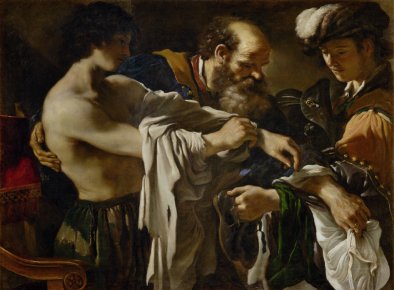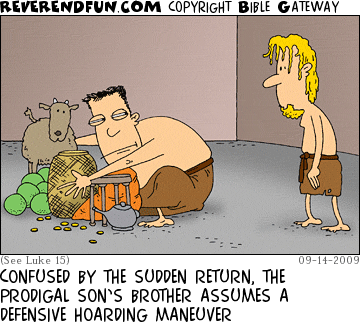Worship Helps for Lent 4
Artwork: The Return of the Prodigal Son
Artist: Giovanni Francesco Barbieri
Worship Theme: Today we see the sincerity of our Savior’s
love. God’s mercies are always waiting for us. God is anxious to forgive us. He
pleads that we come to him and be saved. Such constant and free forgiveness
doesn’t make sense to human logic. But God’s ways are greater than our ways. If
his grace weren’t so great, it couldn’t cover all of our sins. We rejoice in
God’s amazing grace which always gives forgiveness for all sins!
Old Testament: Judges 10:6-16
6Once
again the people of Israel committed evil in the eyes of the Lord. They served the Baals and the
Ashtartes, the gods of Aram, the gods of Sihon, the gods of Moab, the gods of
the people of Ammon, and the gods of the Philistines. In this way they forsook
the Lord and did not serve him.
7So the
anger of the Lord burned against
Israel, and he sold them into the hand of the Philistines and into the hand of
the Ammonites, 8who shattered and crushed the people of Israel that
year.
For the next eighteen years,
the Ammonites oppressed all the people of Israel who were in the territory east
of the Jordan,
in the land of the Amorites, which is in Gilead. 9When the Ammonites
also crossed the Jordan to wage war against Judah and Benjamin and against the
house of Ephraim, Israel suffered great distress.
10Finally the people of Israel called
out to the Lord, “We have sinned
against you, for we have forsaken our God and have served the Baals.”
11At this, the Lord said to the people of Israel, “Did
I not deliver you from Egypt, from the Amorites, from the Ammonites, and from
the Philistines? 12When the Sidonians and Amalek and Maon oppressed
you, and you called out to me, I delivered you from their hands. 13It
is you who have forsaken me and served other gods. Therefore, I will no longer
deliver you. 14Go and cry out to the gods whom you have chosen! Let
them deliver you in the time of your distress!”
15But the people of Israel said to
the Lord, “We have sinned. Do with
us whatever seems good in your eyes, but please save us today.” 16When
they removed the foreign gods from their midst and served the Lord, he could no longer refrain from
relieving the misery of Israel.
1. After the Lord gave the Israelites peace and rest, they
went back to their old ways. List the seven different gods they worshiped. How
did the Lord punish them?
2. What advice did the Lord give the Israelites when they
complained to him?
3. Why didn’t the Israelites follow this advice?
Epistle: James 4:7–10
7So, submit yourselves to God. Resist the
Devil, and he will flee from you. 8Come near to God, and he will
come near to you. Cleanse your hands, you sinners, and purify your hearts, you
double-minded people. 9Lament, mourn, and weep. Let your laughter be
changed into mourning and your joy into gloom. 10Humble yourselves
in the sight of the Lord, and he will lift you up.
4. Carefully work
through each of James’ short statements in verses 7-10. How do each of these
statements flow out of submitting ourselves to God?
Gospel: Luke 15:1–3, 11b–32
All the tax collectors and sinners were
coming to Jesus to hear him. 2But the Pharisees
and the experts in the law were complaining, “This man welcomes sinners and
eats with them.”
3He told them this
parable:
“A certain man had two sons. 12The
younger of them said to his father, ‘Father, give me my share of the estate.’
So he divided his property between them. 13Not
many days later, the younger son gathered together all that he had and traveled
to a distant country. There he wasted his wealth with reckless living. 14After
he had spent everything, there was a severe famine in that country, and he
began to be in need. 15He went and hired
himself out to one of the citizens of that country, who sent him into his
fields to feed pigs. 16He would have
liked to fill his stomach with the carob pods that the pigs were eating, but no
one gave him anything.
17“When he came to
his senses, he said, ‘How many of my father’s hired servants have more than
enough bread, and I am dying from hunger! 18I
will get up, go to my father, and tell him, “Father, I have sinned against
heaven and in your sight. 19I am no longer
worthy to be called your son. Make me like one of your hired servants.”’
20“He got up and
went to his father. While he was still far away, his father saw him and was
filled with compassion. He ran, hugged his son, and kissed him. 21The
son said to him, ‘Father, I have sinned against heaven and in your sight. I am
no longer worthy to be called your son.’
22“But the father
said to his servants, ‘Quick, bring out the best robe and put it on him. Put a
ring on his finger and sandals on his feet. 23Bring
the fattened calf and kill it. Let us eat and celebrate, 24because
this son of mine was dead and is alive again. He was lost and is found.’ Then
they began to celebrate.
25“His older son was
in the field. As he approached the house, he heard music and dancing. 26He
called one of the servants and asked what was going on. 27The
servant told him, ‘Your brother is here! Your
father killed the fattened calf, because he has received him back safe and
sound.’ 28The older brother was angry and refused to go in. His
father came out and began to plead with him.
29He answered his
father, ‘Look, these many years I’ve been serving you, and I never disobeyed
your command, but you never gave me even a young goat so that I could celebrate
with my friends. 30But when this son
of yours arrived after wasting your property with prostitutes, you killed the
fattened calf for him!’
31“The father said
to him, ‘Son, you are always with me, and all that I have is yours. 32But
it was fitting to celebrate and be glad, because this brother of yours was dead
and is alive again. He was lost and is found.’”
5. What do we learn about God’s grace from the “prodigal”son?
6. What do we learn about God’s grace from the “faithful”
son?
Answers:
1. See the list in 10:6. Because they did this, the Lord
oppressed them through the Ammonites and the Philistines.
2. The Lord told them to ask the gods they worshiped to
help them.
3. The Israelites knew the Lord alone could deliver them.
Otherwise they would have first gone to their gods for help. How ironic. The
Israelites worshiped false gods, but really didn’t believe they would help.
Why, then, did they worship these other gods? It all goes back to the sinful
flesh. The flesh hates the true God and will worship anything but him. The
sinful worship practices associated with idol worship are very appealing to the
sinful flesh.
4. Everything begins with submission to God. Then we flee
from the devil. We purify our hearts so they are not filled with lust. We
repent of our sins of fighting and quarrelling and humble ourselves under God’s
will.
5. We learn that our sins do not nullify God’s
grace. “Where sin increased, grace increased all the more” (Romans 5:20 ). God gladly receives and
forgives every penitent sinner, no matter how many or how terrible our sins.
6. We learn that we cannot earn God’s grace by our
faithful service. It is given to us freely in Christ, and is always ours
though faith (v 31). Therefore, we should not be offended when God gives
His grace freely also to another, no matter how notorious a sinner we might
consider them to be.
Putting your faith
into action
Jesus’ parable of the prodigal son, told to the
Pharisees and teachers of the law, is a poignant reminder to us of God our
Father’s unconditional love. As the father in this parable gave his younger son
his share of the estate, welcomed him back after his sin-filled adventures,
celebrated his son’s becoming “alive” again—we are reminded of the many times
that we have felt unforgivable after some of our indiscretions. As children we
probably experienced sinful envy towards brothers, sisters, friends, or
television celebrities who seemed to receive better treatment, better “toys”
than we were given. We can call upon God for help, and he is there for
us—unconditionally. We ask ourselves, “How can God ever forgive me for what I
have done?” But he will, and does, unconditionally with love! And God is
prepared to offer this unconditional love to EVERYONE! As people of God we are
to imitate Christ, including showing this kind of unconditional love to others.
We are to respond to God’s love by loving others—unconditionally.
I advise and exhort with warning and threatening,
restraint and punishment, the children should be trained early to shun
falsehood. They should especially avoid the use of God’s name to support
falsehood. For where children are
allowed to do as they please, no good will result. The world is worse than it has ever been, and
there is no obedience, no loyalty, no faith, but only unbridled people. No teaching or reproof helps them. This is God’s wrath and punishment for such
lewd contempt of this commandment.
On the other hand, children should be urged to honor God’s
name and to have it always upon their lips for every-thing that may happen to
them or come to their notice. The true
honor of His name is to look to it and call upon it for all consolation. Then the heart by faith gives God the honor
due Him. Afterward, the lips give Him
honor by confession.
This is also a blessed habit and effective against the
devil. He lies in wait to bring us into
sin and shame, disaster and trouble. But
he hates to hear God’s name and cannot remain long where it is called upon from
the heart. Many terrible disasters would
fall upon us if God did not preserve us by our calling upon His name. I learned by experience that often great
suffering was immediately averted by calling on God. To confuse the devil, I say, we should always
have this holy name in our mouth, so that the devil may not be able to injure
us as he wishes. – Large Catechism, Second Commandment (paragraphs 69-72)
1 Just as I am, without one plea But that thy
blood was shed for me
And that thou bidd’st me come
to thee, O Lamb of God, I come, I come.
2 Just as I am and waiting not To rid my soul
of one dark blot,
To thee, whose blood can
cleanse each spot, O Lamb of God, I come, I come.
3 Just as I am, though tossed about With many a
conflict, many a doubt,
Fightings and fears within,
without, O Lamb of God, I come, I come.
4 Just as I am, poor, wretched, blind; Sight,
riches, healing of the mind,
Yea, all I need, in thee to
find, O Lamb of God, I come, I come.
5 Just as I am, thou wilt receive, Wilt
welcome, pardon, cleanse, relieve;
Because thy promise I
believe, O Lamb of God, I come, I come.
6 Just as I am; thy love unknown Has broken
ev’ry barrier down.
Now to be thine, yea, thine
alone, O Lamb of God, I come, I come.
Text: Charlotte Elliott,
1789–1871.


Comments
Post a Comment